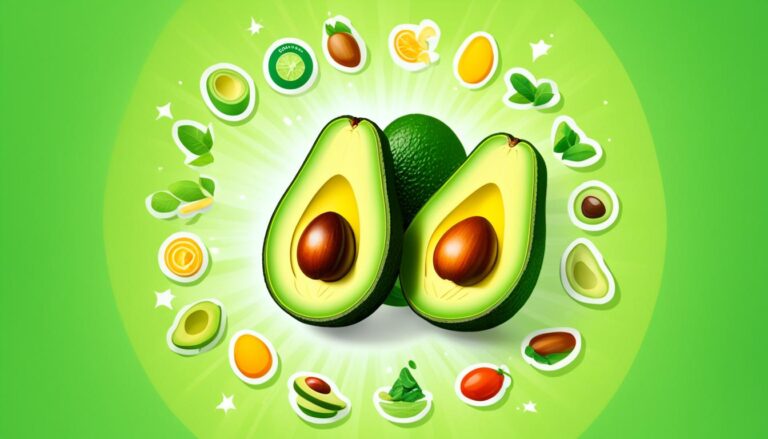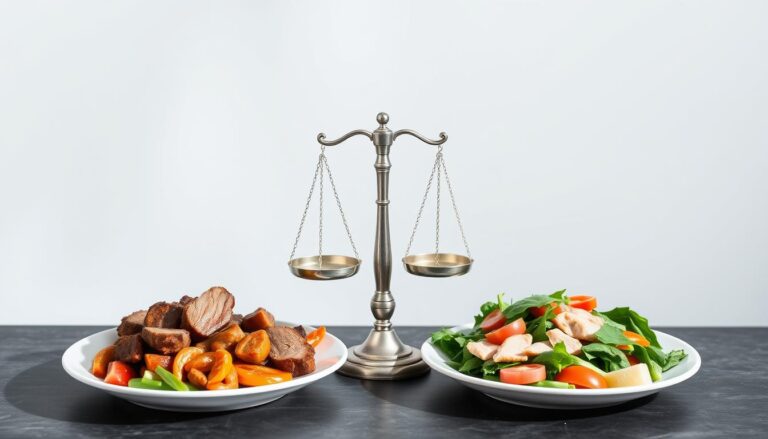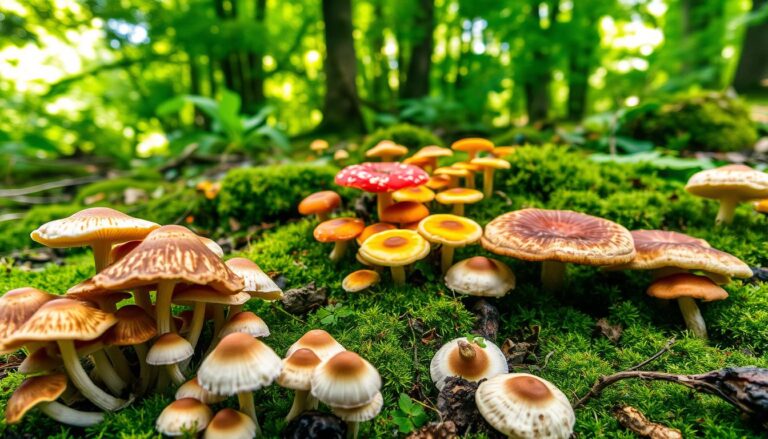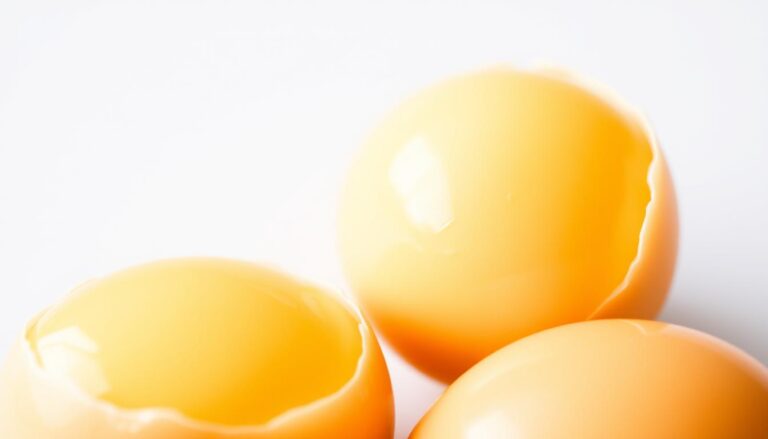Are you wondering how to get enough protein on a vegan diet? It’s easier than you might think! Vegans have many protein rich plant based sources. Legumes, nuts ancient grains and soy based products are just a few examples.
Key Takeaways
- Protein makes up about 17% of the body’s weight, and adults need 45-56g per day.
- Vegan diets can provide all the protein you need, but may pose challenges for athletes.
- Quinoa, lentils, tofu, and nutsseeds are excellent plant based protein sources.
- A well-planned vegan diet with minimally processed foods can be healthy at all stages of life.
- Certain plant foods like legumes, grains, and greens contain surprisingly high amounts of protein.
Introduction to Vegan Protein Sources
Protein is key for our health and well-being. Some worry about getting enough vegan protein requirements on a plant-based diet. But, studies show a well-planned vegan diet can give you plenty of high-quality plant-based protein sources.
Common Concerns About Vegan Diets and Protein
Many think plant proteins are incomplete or less good than animal proteins. But, foods like soy, quinoa, and mycoprotein are complete proteins. They have all the amino acids your body needs.
Also mixing incomplete protein sources, like grains and legumes, makes a complementary protein. This mix meets your body’s amino acid needs.
Benefits of a Well Planned Vegan Diet
A good vegan diet gives you lots of protein and other important nutrients. It’s full of fiber vitamins, and minerals. A balanced vegan diet may also lower the risk of chronic diseases and improve gut health.
By eating a variety of plant-based protein sources, you can meet your daily protein requirements. This supports your health and wellness.

Seitan The Wheat Based Protein Powerhouse
For vegetarians and vegans, seitan is a key part of their diet. It’s also known as wheat meat or wheat gluten. Unlike soy-based alternatives, seitan looks and feels like real meat when cooked. It’s packed with 25 grams of protein per 3.5-ounce serving, making it a top plant-based protein source.
Seitan is not just high in protein. It also has selenium and small amounts of iron, calcium, and phosphorus. But, people with gluten disorders like celiac disease should not eat it because it’s made from gluten.
| Nutrient | Seitan per 100g | Tofu per 100g |
|---|---|---|
| Protein | 20-25g | 10-15g |
| Carbohydrates | 2g | 2g |
| Fat | 2g | 5g |
| Calories | 150 | 130 |
The table shows seitan has more protein than tofu. This makes it great for a high-protein vegan or vegetarian diet. Seitan also has a good protein-to-fat ratio, which is good for a balanced diet.
Making seitan at home is easy. You can use vital wheat gluten flour. Season it with soy sauce for flavor. It can be stored in the fridge for a week or frozen for later.
Seitan is a great choice for anyone looking to eat more plant-based protein. Its high protein and meat-like texture make it perfect for many dishes. Try it in stir-fries, casseroles, sandwiches, and burgers.
Soy Based Proteins Tofu Tempeh and Edamame
Soy products like tofu, tempeh, and edamame are great for vegans and vegetarians. They are not just high in protein but also rich in other nutrients.
Nutritional Profile of Soy Products
Tofu, made from soybean milk, has about 9 grams of protein per 3-ounce serving. Tempeh a fermented soy product has 17 grams of protein per half cup. Edamame, or immature soybeans, has 9 grams of protein per half cup.
Soy is special because it’s a complete protein. This means it has all the amino acids the body needs. It’s perfect for those on a plant-based diet looking to meet their protein needs.
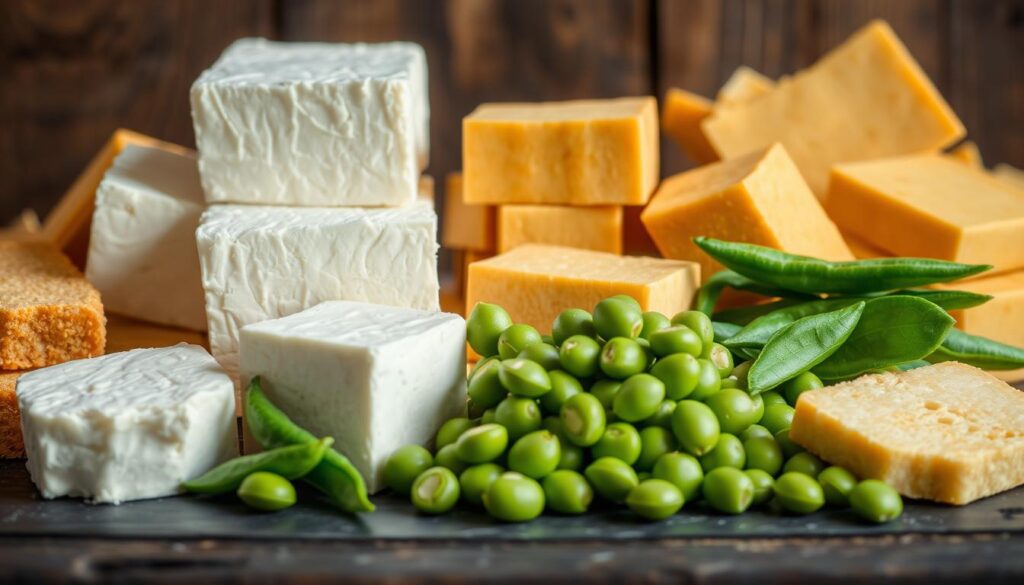
Soy products are a versatile and nutritious addition to any vegan or vegetarian diet. From tofu’s firm texture to tempeh’s nutty flavor, these soy-based proteins offer a range of culinary possibilities.
Edamame is also packed with folate, vitamin K, and fiber. These nutrients help with digestion and regularity. Tempeh on the other hand, is full of probiotics B vitamins, and minerals like magnesium and phosphorus.
Adding different soy based proteins to your diet is a smart move. Whether you pick tofu, tempeh, or edamame, they can make your meals tasty and nutritious.
What foods are high in protein for vegans?
Vegans looking to increase their protein can find plenty in legumes like lentils and beans. These foods are not only affordable but also packed with nutrients. They can be easily added to many vegan dishes.
Lentils A Fiber and Protein Rich Legume
Lentils are a great source of vegan protein, with 18 grams per cooked cup. They also have a lot of fiber, over half of what you need daily in one serving. The fiber in lentils helps the good bacteria in your gut, improving digestion.
Beans Versatile and Packed with Plant Protein
Beans like kidney, black, pinto, and chickpeas have about 15 grams of protein per cup. They’re also full of complex carbs, fiber, and minerals like iron and potassium. Eating beans can help lower cholesterol, control blood sugar, and even reduce belly fat.

Lentils and beans are top choices for vegans wanting more protein. Adding these legumes to your meals can greatly increase your plant-based protein intake. This supports your health and well-being.
Nuts Seeds and Their Butters Protein Packed Snacks
Vegans looking for easy and protein-rich snacks can find great options in nuts, seeds, and their butters. These foods are not only high in protein but also packed with other important nutrients.
Hemp seeds are a powerhouse with 9 grams of protein in just 3 tablespoons. They also have good amounts of omega-3 and omega-6 fatty acids. Almonds and their butter are also high in protein, with 20 and 21 grams per 100 grams, respectively.
Chiaseeds are another great choice for vegans, with 18 grams of protein per 100 grams. Peanuts and peanut butter are also high in protein, with 26 and 23 grams per 100 grams. Adding different types of nuts, seeds, and their butters to your diet is a simple way to increase your protein intake.
| Food Item | Protein Content per Serving |
|---|---|
| Chia Pudding made with plant-based milk | Up to 13 grams per serving |
| Tofu 3-ounce serving | 4 to 8 grams |
| Soy Yogurt per serving | Approximately 7 grams |
| Roasted Chickpeas 1-ounce serving | 3 times the protein of potato chips |
| Nuts and Legumes 1-ounce serving | Up to 7 grams |
| Wasabi Peas 1-ounce serving | Approximately 4 grams |
| Strawberry Pineapple Smoothie with almond milk and almond butter | 6 grams per serving |
| Hummus and Bean Dips | 2 to 7 grams per serving |
| Seeded Crackers | Up to 3 grams per serving |
By mixing different protein-rich snacks into your diet, vegans can easily meet their daily plant-based protein needs. This way, they can enjoy tasty and fulfilling snacks.
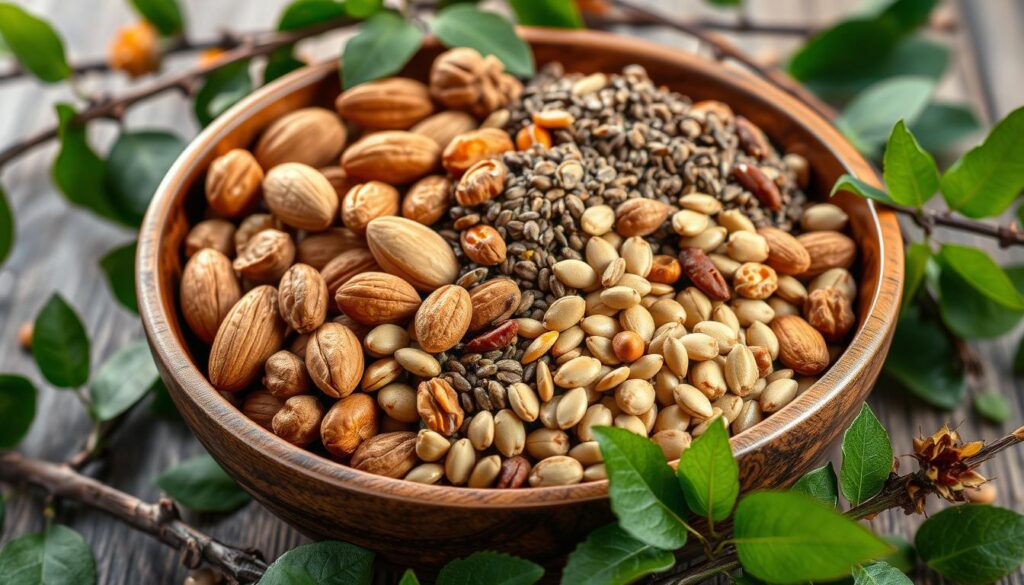
Ancient Grains and Pseudocereals Unexpected Protein Sources
The popularity of ancient grains and pseudocereals is on the rise. These foods are not just tasty. They are also packed with plant based protein, making them great for vegans.
Spelt Teff and Other Ancient Grains
Spelt and teff are more than just carbs and fiber. They are also high in protein. A cup of cooked spelt has 10-11 grams of protein. Teff, being gluten free offers a similar amount.
These grains are also rich in vitamins and minerals. You’ll find iron, magnesium, phosphorus, and manganese in them.
Amaranth and Quinoa: Nutritious Pseudocereals
Amaranth and quinoa are like grains but are technically pseudocereals. They have 8-9 grams of complete plant-based protein per cup. This makes them very nutritious for vegans.
Quinoa’s protein is special because it has all nine essential amino acids. This is rare in plant foods.
Ancient grains and pseudocereals are not just good for protein. They also offer many other nutrients. Adding them to your meals can help you meet your protein needs. Plus, they make your vegan diet more interesting and nutritious.
| Food | Protein g per cooked cup |
|---|---|
| Spelt | 10-11 |
| Teff | 10 |
| Amaranth | 8-9 |
| Quinoa | 8-9 |
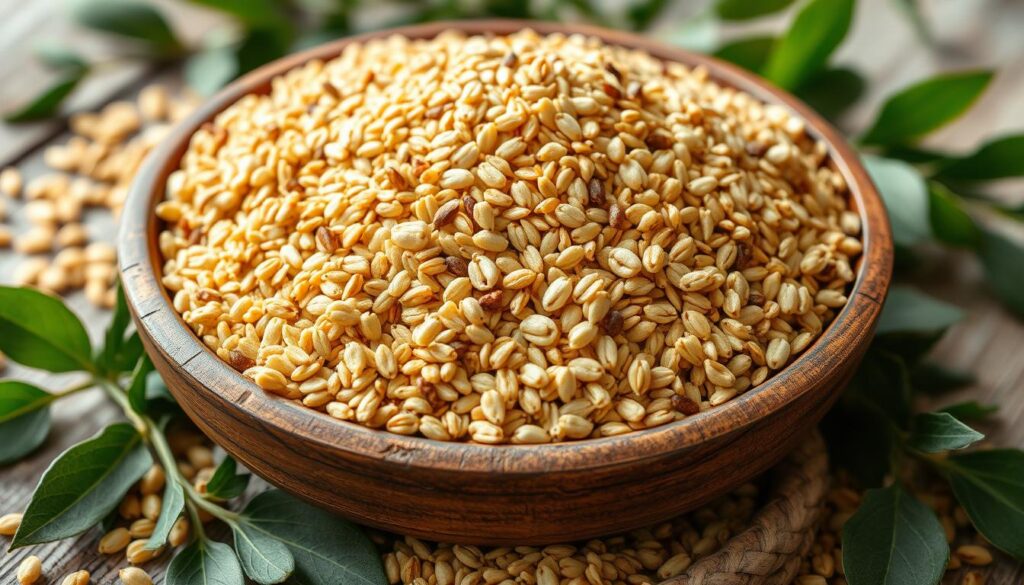
Pseudocereals like amaranth and quinoa can be prepared similarly to grains and offer complete plant-based protein along with a variety of essential nutrients.
Nutritional Yeast A Vegan’s Best Friend
Finding enough plant-based protein can be tough for vegans. But, nutritional yeast is a game-changer. It’s a type of yeast that’s sold as a yellow powder or flakes.
Just half an ounce 16 grams of nutritional yeast packs 8 grams of complete plant-based protein and 3 grams of fiber. It’s also packed with B vitamins, including vitamin B12. This is a big win for those on a vegan diet.
- Nutritional yeast is rich in zinc, magnesium, copper, and manganese, all key for health.
- It’s low in fat, sodium, and sugar, making it great for vegan cooking and baking.
- Nutritional yeast adds a savory, cheesy flavor to dishes like vegan mac and cheese and roasted veggies.
For vegans and those on a plant-based diet, nutritional yeast is a must have. It boosts the protein, vitamin, and mineral content of meals and snacks. Its versatility and nutritional benefits make it a true vegan’s best friend.
Nutritional yeast is a game-changer for vegans. It’s a complete protein source and an excellent way to get those all-important B vitamins. – Jane Doe, Vegan Nutritionist
Green Vegetables More Than Just Fiber
Green vegetables are not just high in fiber. They are also packed with plant-based protein. For example, broccoli has 2.8 grams of protein per cooked cup. Spinach offers 2 grams of protein per cooked cup. Mushrooms, asparagus, and Brussels sprouts also add protein to your diet.
Adding these green vegetables to your meals can increase your protein intake. This makes them a great choice for a vegan diet. By choosing protein-rich vegetables, vegans can easily get enough protein from plants.
Broccoli Spinach and Other Greens for Protein
- Broccoli – 2.8 grams of protein per cooked cup
- Spinach – 2 grams of protein per cooked cup
- Asparagus – 4 grams of protein per cup
- Brussels sprouts – 3 grams of protein per cup
- Kale – 5 grams of protein per cup
- Watercress – 2.3 grams of protein per 100 grams
- Alfalfa sprouts – 4 grams of protein per 100 grams
By adding these green vegetables to your plant-based protein diet, you meet your protein needs. You also get many health benefits from these protein-rich vegetables.
Sprouted Grain Breads and Fortified Plant-Based Milks
Vegans looking to increase their protein can find great options in sprouted grain breads and protein-fortified plant-based milks. Sprouted grain breads, like Ezekiel bread, are made from sprouted whole grains and legumes. This process makes nutrients, including protein, easier for our bodies to use.
Two slices of Ezekiel bread have about 8 grams of protein. This is more than most breads. Also, some plant-based milk alternatives, like soy milk, are enriched with proteins and vitamins. This makes it easy for vegans to get the nutrients they need.
- Ezekiel bread contains 8 grams of protein per 2 slices
- Soy milk and other plant-based milks are often fortified with proteins, vitamins, and minerals
- These sprouted grain breads and protein-fortified foods can help vegans meet their daily protein needs
By picking these protein-rich and fortified plant-based foods, vegans can meet their protein needs. This supports their health and well-being.
Conclusion
A well planned high-protein vegan diet offers plenty of protein from plant-based protein sources. Foods like seitan, soy products, legumes, nuts, seeds, and protein-rich veggies are great options. These foods make it easy to meet protein needs while enjoying a variety of tastes.
By choosing whole, unprocessed foods, vegans can get all the nutrients they need. This approach helps vegans get all the amino acids their body needs. Eating a variety of plant-based protein sources is key to a healthy vegan lifestyle.
Overall, a well-thought-out vegan diet is not only nutritious but also sustainable. It provides plenty of protein and other important nutrients. By focusing on whole, plant-based foods, vegans can maintain a balanced diet that supports their health and fitness goals.
